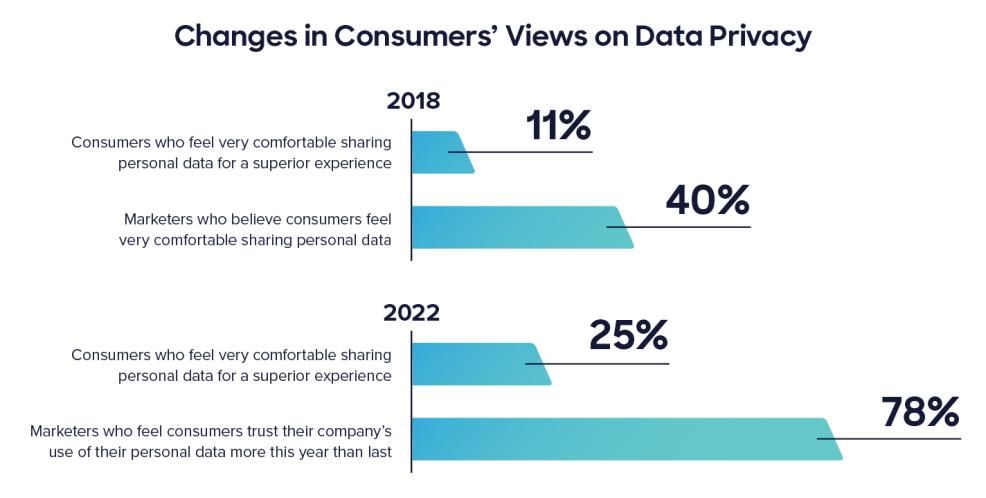
How Consumers’ Views on Data Privacy Have Changed Over Five Years

Five years ago, Acquia set out to gain a global perspective from marketers and consumers about what makes or breaks the customer experience (CX). Knowing that customer data fuels strong CX, one area we asked about concerned data privacy: What did marketers think consumers felt about brands using their data versus how consumers actually felt?
We discovered a trust gap: While 40% of marketers claimed that consumers were “very comfortable” with sharing personal information in exchange for a superior experience, only 11% of consumers expressed that comfort level. Additionally, 79% of consumers thought brands shouldn’t use their data to market different things to them.
Intrigued, we continued to ask questions along those same lines in four subsequent annual reports. The wording changed throughout the years, and so did the composition of global respondents.
Our most recent CX report, which surveyed marketers and consumers in the United Kingdom and the United States, found that 78% of marketers think their customers trust their company’s use of their personal data more this year compared to last.
Yet only half of consumers (51%) trust that all brands will handle their personal data properly. Likewise, a mere 25% of consumers say they are “very comfortable” giving brands their personal data in exchange for an improved experience like freebies or more personalized offers.

These numbers have led us to this conclusion: The trust gap still exists, but it’s likely shrinking. Marketers continue to overestimate the confidence consumers have in how they handle customer data, but consumers are becoming more at ease about handing over their information for an experience they value.
The trust gap still exists, but it’s likely shrinking.
Marketers need to take steps to further close this gap, and they need to do so quickly. With third-party cookies on the outs — the trackers will largely disappear when Google starts removing them from Chrome in 2024 — collecting first-party data has become even more critical.
Why are consumers loosening their grip on data?
Our research doesn’t delve into why consumers are feeling more comfortable about sharing their personal information, but a 2022 report from the Global Data and Marketing Alliance (GDMA) and Acxiom helps support some theories we have.
We know consumers respond to tailored and relevant experiences. For instance, personalized emails from MCM Worldwide generated 3X more revenue than its previous “business-as-usual” emails. The luxury leather goods brand was able to create those more customized emails because it could leverage data to segment and better understand its audience.
Consumers are recognizing this tradeoff. The GDMA/Acxiom study found 30% of respondents in 10 global markets say they would be likely to exchange personal data in return for personalized products or services.
In addition, privacy regulations may be influencing consumers in a few different ways. Public awareness of the General Data Protection Regulation (GDPR), for example, has more than doubled in all European markets since 2018, according to the report. Awareness in the UK rose to 73% in 2022 from 32% five years ago. Having privacy rules in place — and potentially more on the horizon — may be reassuring to consumers.
They may also be feeling more in control of their data, perhaps because of the existing regulations’ consent requirements and rules around transparency. The GDMA/Acxiom report found the number of consumers in those markets who state that they have no control over ensuring that brands use their data for the purpose agreed to has fallen from 54% in 2018 to 45% today (though that number is still too high).
Likewise, many consumers view data as a tool they can leverage rather than something they must simply give up. The report found 53% of consumers in those same markets view their personal information as an asset to negotiate better prices and offers with companies, which is up from 46% in 2018.
Actions marketers can take to boost trust
We can surmise, based on our own recent CX survey, that privacy seekers will celebrate the end of third-party cookies. Around eight in 10 consumers (83%) believe their data will be more private when web browsers phase out tracking cookies.
But the deprecation of those cookies is just one piece of the privacy puzzle. Here are some measures that companies can take to help build and keep the trust of customers and prospects:
- Offer consumers a clear value for sharing their data and take steps to ensure they see an immediate improvement in their CX as a result of the information they share.
- Be transparent about customer data. Clearly explain why you collect it, whether or not you sell it, how you use it, and how you keep it secure.
- Give customers control over their data. This means obtaining their consent, providing access to their information, allowing them to edit it, and complying when a customer asks to be forgotten.
- Partner with your internal IT and security teams to ensure you’re fully complying with GDPR, the California Consumer Privacy Act (CCPA), and other data compliance standards. Our recent CX report found that, while 58% of marketers say their organization follows policies designed to protect the privacy of customer data “to a great extent,” an alarmingly high 39% say they do so only “to some extent.”
Consider using software applications that incorporate both security controls and governance from the start and that allow for flexibility within restraints.
To learn more about the shifting expectations that marketing decision makers and consumers have about customer experience, data privacy, and more, please download Create Engaging Customer Experiences. Launch Faster. (CX Trends Report).

